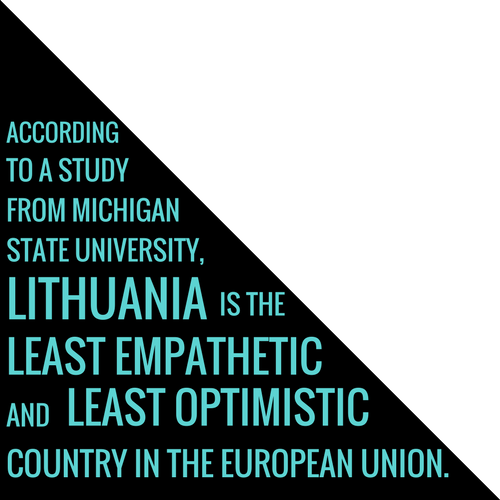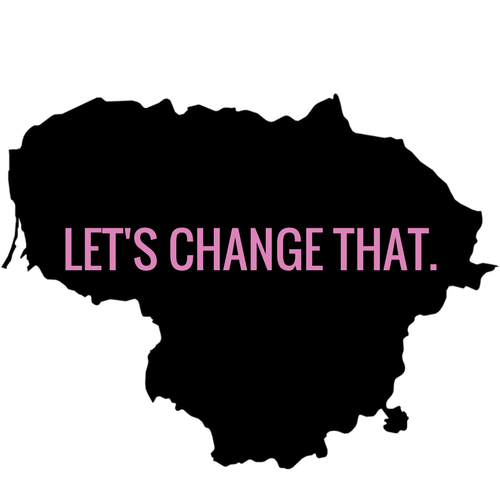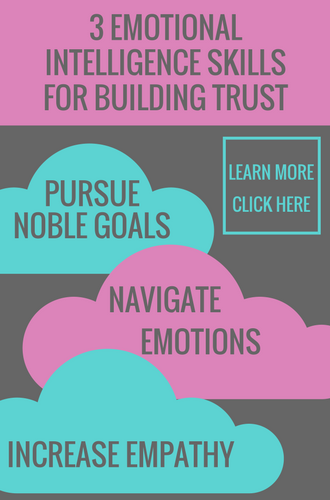"HIS EYES LIT UP, AND THEY STAYED LIT UP FOR THE ENTIRE SHOW."
Leshek describes the experience of taking Dovydas to his very first theater show. “I took him because I could tell he was excited when I asked if he wanted to go.” But he had no idea the impact it would have. “Dovydas was so impressed by the show that he started a drama club at his school. Now he puts on theater productions of his own!”
Leshek, a bank manager, and Dovydas, a local teenager, met through Mentor Lithuania, an organization that provides emotionally intelligent role models for teenagers. The hope is to foster the dreams and possibilities of the local children through relationships– just like Dovydas’ passion for theater was nurtured by Leshek.
Providing coaching for the mentors in Mentor Lithuania is the latest way in which Nomeda Maraziene, CEO of Leadership Experts Group, hopes to change the outlook for emotional intelligence in Lithuania, one person at a time.
“WE ARE TACKLING TWO UNIQUE CHALLENGES AT THE SAME TIME,”
says Nomeda. “To help teenagers at a challenging time in their lives, which is a universal phenomenon, and to improve emotional intelligence in Lithuania, which is unique to this place.” Let’s start with taking a look at the situation in Lithuania:
LITHUANIA– THE LEAST EMOTIONALLY INTELLIGENT COUNTRY IN EUROPE?


Nomeda Marazienė is the CEO of Lyderystės Ekspertų grupė (Leadership Experts Group), an EQ consulting firm and Six Seconds Preferred Partner. A medical doctor and psychologist by trade, Nomeda found her true passion in teaching the skills of emotional intelligence, in part because of the fact that these skills are sorely lacking in her home country.
“All of us are responsible for the emotional culture we create in our country. It’s a shared responsibility to improve it.” Since she left the pharmaceutical industry to teach emotional intelligence full time, she is doing everything she can to change the emotional culture in Lithuania, especially for the younger generation.
A few years ago, Nomeda’s consulting firm partnered with Barclays Group Unlimited to help improve the emotional culture at a foster care center in Didziasalis, a small town on the border with Belarus. In one year, Nomeda and her group witnessed an amazing transformation in the emotional culture of the foster care center. You can read more about that project here.
Her most recent project is supporting this mentorship program run by Mentor Lithuania that connects young professionals and teenagers in the capital, Vilnius. As in the rest of the world, teenagers are more stressed and lonely than ever before, and LEG provides emotional intelligence training so that the mentors feel prepared to be role models for them and
“EMPOWER, INSPIRE, AND MOTIVATE THESE YOUNG PEOPLE.”
“In the turbulence of adolescence, many teens feel isolated and disconnected”
says Josh Freedman, the CEO of Six Seconds, a global non-profit that teaches emotional intelligence and came up with the framework that Nomeda uses to teach EQ. “They are biologically driven to self-absorption and short-term thinking — which fuels this loneliness and disconnection.”
Mentorship programs, Josh says, help to combat this challenge for teenagers. “Positive mentorship for teens can create a new lens on the world, and thereby, on themselves. A trustworthy mentor builds a vision of possibility, and helps teens see themselves as active members of society with a path to contribution.”
This is exactly what happened with Leshek and Dovydas, says Nomeda: “The mentor brought this wider perspective and created the context, and in concert with the teenager, helped him find his own way. And this is the beautiful part of the program.”
As I talked to other mentors, I realized this experience has been shared by many mentors and mentees in the program.
For example, check out this story of Mindaugas and Dimitrijus bonding over sports, and then exploring together Dimitrijus’ dream of becoming a fire fighter.
“AT FIRST, THINGS FELT AWKWARD”
says Mindaugas, an SEB bank manager in his 30s who started meeting with his mentee, Dimitrijus, about 9 months ago. Even though things felt awkward at first, they found common ground before long through their love of sports. They went running, cycling, and played football. They even competed in a 5k race together.
This helped lay the foundation of their friendship, and they branched out from there.
Dimitrijus came over to Mindaugas’ house to cook dinner and came to see where he worked. They started talking about what he wanted to do for work one day, and that led them to an open house at a fire station. They had a blast, learning about what you need to do to become a firefighter and even participating in fire fighting drills.
THEN, THEY MADE A LIST OF WHAT HE COULD NOW, AND IN THE YEARS AHEAD, TO MAKE HIS DREAM OF BECOMING A FIREFIGHTER COME TRUE.
The program is relatively simple.
It lasts for a year and the mentors and mentees meet at least twice a month. They meet up to have a conversation, to share their experiences, their attitudes, and their approaches toward life. “It’s possible to give teenagers emotionally intelligent role models, at an age when they really need someone who is more mature, wise and experienced to support them,” says Nomeda.
Mentor Lithuania strives to provide both logistic and emotional support. In terms of logistics, the program provides a small stipend for activities, like going to the theater or a sporting event. But the bigger investment they make is in equipping the mentors with the emotional tools they need to be successful, and a part of that is providing emotional intelligence training before the program begins.
“I LOVE THE TRAININGS BECAUSE THE MENTORS REALLY WALK AWAY WITH THE TOOLS TO MAKE POSITIVE CHANGE. FIRST, THEY POSITIVELY CHANGE THEMSELVES. THEN, THEY PROVIDE THE SPACE AND TOOLS FOR THEIR MENTEES TO MAKE POSITIVE CHANGES WITHIN THEMSELVES.”
The prospective mentors all complete a 16-hour training course, which includes taking the SEI, Six Seconds’ emotional intelligence assessment, and completing a group workshop on EQ. This crash course in being smarter with feelings helps them both personally and, hopefully, in their work as mentors. “I love the trainings because the mentors really walk away with the tools to make positive change. First, they positively change themselves. Then, they provide the space and tools for their mentees to make positive change within themselves,”says Nomeda, who leads these emotional intelligence workshops.
The workshop teaches emotional intelligence skills like increasing empathy, pursuing noble goals, and navigating emotions – and these skills help the mentors develop strong friendships with their mentees at a time in their life when they crave connection.
WHAT DO TEENAGERS NEED?
“They need someone who will listen to them empathetically, with respect, with unconditional respect. Many teenagers feel a lack of this in their families, so they need to feel like their opinions and attitude are validated and respected.”
Lina, a mentor who worked with her mentee Olga for 1 year, says that this ability to listen empathetically is the biggest thing she learned as a mentor: “All you have to do is listen: not talk, not give advice, but listen. Just as I started to talk less and listen more I felt that my mentee started to trust me more, tell me more, and ask for my advice if she needed it.” It’s a lesson, she says, that she is also applying to her life with other adults. Deep, empathic listening is a sure way to connect more deeply.
Lina originally signed up to a mentor because she had been bullied at school and wanted to help, to share how she overcame those struggles. And she got a chance to do exactly that. Throughout the year they worked together, Lina helped Olga make progress with her brother, who was bullying her, and start to be more engaged in her academic work. But by the end of the program, she realized that she had gotten something amazing and unexpected: “I really got a friend. Not just a mentee, a young girl who needed help, but a real equal and a true friend.”
AND OLGA GOT NOT ONLY A FRIEND– BUT AN EMOTIONALLY INTELLIGENT ROLE MODEL.
And these are exactly the kinds of stories that drives Nomeda and the Leadership Experts Group to do what they do– sharing the skills of emotional intelligence in Lithuania, one person at a time.
- Identify Your Most Fulfilling Career: A Step-by-Step Guide for Women - March 21, 2022
- POP-UP Festival Partnership with AEON Corporation - March 9, 2022
- 3 Interview Tips for Women from an Executive Emotional Intelligence Coach - February 9, 2022


I’ve been trying hard to get information about your trainings in Singapore for getting certified for teaching EQ But have failed. Please help me. Thanks
Hi Jena, I’m sorry to hear that. I have passed along your comment and email to my coworker Francesca, who will be in touch shortly to discuss your goals and options for certification in Singapore!
This is a new insight to my existing repertoire on Emotional Intelligence. Thank you Six Seconds..
Such an inspiring story about modeling EQ tools for our vulnerable young citizens! Such an encouraging report on the power of role models and mentors on making a positive impact in a young person’s life’s trajectory. Thank you for this vital work you do everyday.
Such a great initiative. having mentored over 1000 teenagers myself, the connection one establishes as a non-judgmental Cheerleader in a young life is so rewarding and satisfying. Please feel free to check out my website where there are plenty of free resources linked to youth mentoring http://www.yess.co.nz
I mentored many high school and middle students in my 42 year career as a school librarian. I work in a very rewarding way with young African Americans males 12 to 18. I feel with your EQ training I could continue as a volunteer at a homeless shelter ( upward mobility for families including teenagers.) As a librarian I was one of the few adults who could work one one with at risk students.
I would like to know more about your certification, time, studies, cost, etc.
I’d like to share my story of a mentor who really changed my life. He was a baseball coach and computer science teacher at my high school, Steve Nicolerat. I didn’t even play baseball, but we bonded when I took his class as a freshman. I remember going through a hard break up and he listened to me so beautifully. And then he gave me amazing life advice in many other areas, too. Thank you, Steve!